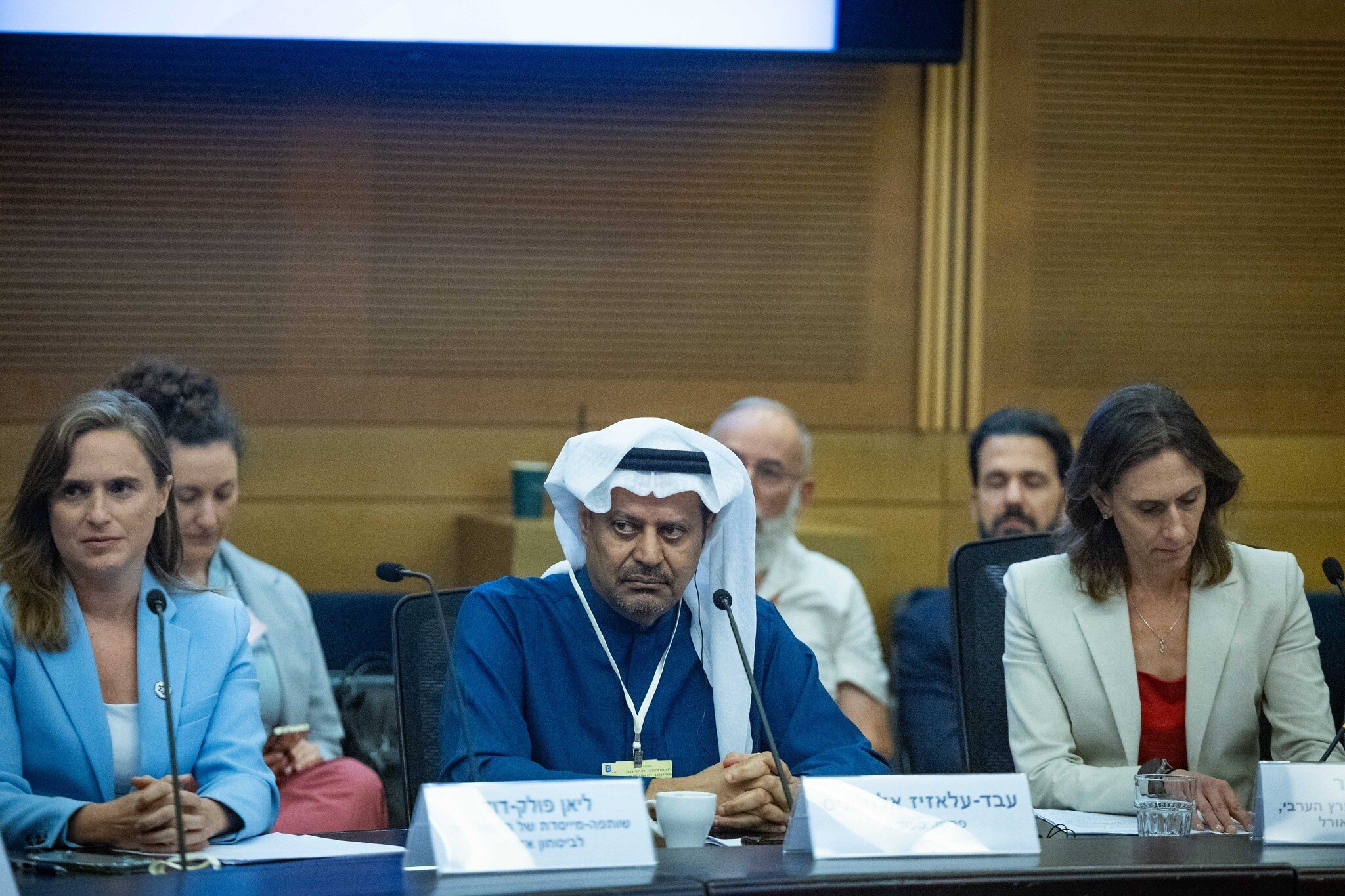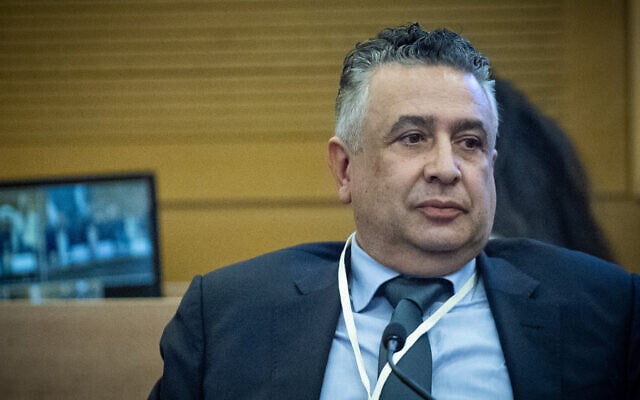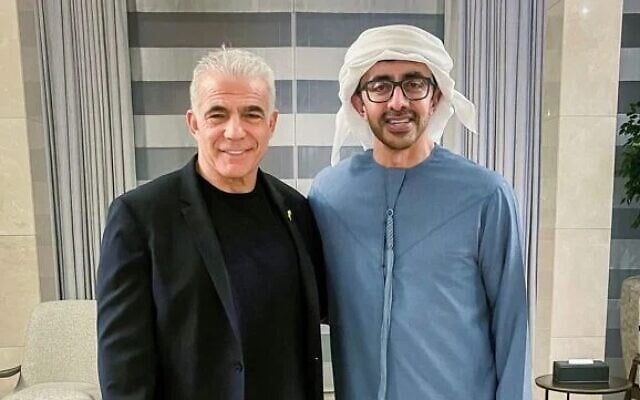



A Syrian activist who paid a rare visit to the Knesset Wednesday said new Syrian president Ahmed al-Sharaa had called the movement toward forging peace with Israel a once-in-a-century opportunity, but worried the chance could slip away.
Businessman and political activist Shadi Martini recalled his meeting with Sharaa while speaking at the inaugural conference of a Knesset lobby aimed at advancing a regional security arrangement, attending alongside Saudi journalist Abdulaziz Alkhamis.
The two attended the meeting of the Lobby for Advancing a Regional Security Arrangement against the backdrop of Prime Minister Benjamin Netanyahu’s visit to Washington and public optimism about potentially expanding the Abraham Accords normalization agreements. The lobby was jointly founded by opposition MKs Ram Ben Barak, Gilad Kariv and Alon Schuster.
Speaking in English about new opportunities for cooperation between Israel and the new Syrian government, Martini — who fled Syria during its civil war in 2012 — told lawmakers at the conference that he had an “interesting meeting” with Sharaa around two weeks ago.
“I was with two other colleagues, one is a priest and one is a rabbi… We entered the presidential palace in Damascus. I really appreciated that meeting. It went on for two hours, and the topic of Israel was dominant,” he said.
Martini noted that “one thing that stuck with me that President al-Sharaa said was: ‘We only have these opportunities one time every 100 years, it’s a very unique opportunity, but the window will not always stay open.'”
He suggested that Israel’s attacks on Hezbollah last year and the killing of the group’s leader, Hassan Nasrallah, were the key events that allowed opposition forces in Syria to rapidly overthrow the government in December: “For Syrians, we were very happy with what Israel did, we really appreciated it.”
That sentiment, however, was reversed by extensive Israeli military activity in Syria in the wake of Bashar al-Assad’s fall, he said.
“Israel needs to explain what’s the end game here,” he said, decrying Israeli troops blocking Syrian farmers from accessing their land on the Syrian side of the Golan Heights. “We need to understand.”
Martini noted that he was born and raised with strong “negative stereotypes” about Israelis, and was surprised to hear from Israelis who reached out to help him and his family amid the civil war.
Trust, he said, “is one big commodity that is lacking in the Middle East.”
He described Hamas’s October 7 attack as a “huge, huge tragedy, and a massacre,” expressing hopes for a ceasefire and the return of the hostages, enabling “the Palestinian people in Gaza to be able to go home and live peacefully.”
Also addressing the meeting on Wednesday, Alkhamis pointed out that “from the Saudi lens,” the fate of Palestinians in Gaza “lies [at] the heart of the matter.”
“No state can expect to be impressed when our people next door are encaged and disenfranchised,” he said in English. “Normalization from Saudi Arabia’s perspective is not merely a dual agreement, it’s a regional realignment, and such realignment must include a credible and tangible path to Palestinian sovereignty.”
Israel must commit “not just to security but to coexistence,” Alkhamis added. “From Riyadh to Abu Dhabi, the lesson is not about who won the battle, but what comes after.”
“Today Saudi Arabia and Israel stand at the edge of a new era, one shared not by old slogans but shared interests — energy transition, economic modernization, AI innovation, climate security, Red Sea security,” he continued. “Do we cling to the 20th century, with its borders soaked in blood and ideologies stuck in time? Or do we redraw the map — geopolitically, economically, morally?”
Israel and Saudi Arabia were reportedly on the verge of signing a normalization deal before Hamas’s October 7 onslaught, which set off the ongoing Israeli war against Hamas in Gaza, currently in its 22nd month. Saudi leaders have indicated in recent months that they are still interested in normalizing ties with Israel, but it would only come after a ceasefire and include a commitment to establishing a Palestinian state.
Also speaking at the conference, Opposition Leader Yair Lapid said that if Sharaa were to take demands for the Golan Heights off the table in a potential peace agreement, he intends for Israel to lead a regional effort to help rebuild Syria.
“I told the Emiratis in Abu Dhabi: We will know how to build a complete regional coalition around [Sharaa] that will assist in the reconstruction of Syria if he takes the Golan Heights issue out of the equation,” declared Lapid, who briefly served as prime minister in 2022.
Lapid held a brief meeting last week with Emirati President Mohammed bin Zayed Al Nahyan and Foreign Minister Abdullah bin Zayed Al Nahyan during his visit to Abu Dhabi.
Last week, Foreign Minister Gideon Sa’ar said that Israel is interested in expanding “the circle of peace,” including with Syria and Lebanon, adding that the Golan Heights “will remain part of Israel” under any future peace agreement.
The fall of the Bashar al-Assad regime in Syria last year opened up the previously unthinkable possibility of Jerusalem and Damascus cementing a peace deal, with interim Syrian leader Sharaa not ruling out such a deal. Israeli officials have admitted that the two nations are in “advanced talks” on a bilateral agreement to end hostilities between them that would stop short of a full peace deal.
While Netanyahu declined to reveal earlier this week whether Israel is engaged in direct talks with Syria, National Security Adviser Tzachi Hanegbi told Israel Hayom last month that “there is direct daily dialogue at all levels between Israel and the regime in Syria.”
Israeli officials initially branded Syria’s new rulers “terrorists” due to their al-Qaeda-linked past, and the Israeli Air Force waged a fierce campaign of aerial bombardment on what it said were military targets across the country. The hostilities have subsided since mid-May, when US President Donald Trump turned decades of American policy on its head by lifting sanctions on Syria and meeting Sharaa in Riyadh.


